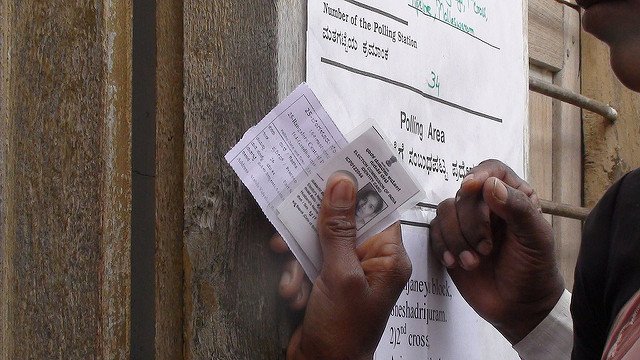Read in : தமிழ்
(This article was first published in July 2018)
The first part of the article dealt with how the one nation, one poll proposal may be help BJP in the short-term by giving it an advantage in the next Lok Sabha polls. The question is whether it has the intention or the stomach to really carry it to its full extent since it is a complex issue and would require sustained effort and wide consensus.
A draft white paper released by the Law Commission of India has recommended holding of simultaneous elections to the Lok Sabha and the Assemblies, possibly in 2019. However, it notes that this can be done only by amending the Constitution, Representation of the People Act of 1951 and the Rules of Procedure of the Lok Sabha and Assemblies.
The one-poll proposal means sorting out a vast gamut of legal issues right from Constitutional hurdles and the inability to reach a consensus among political parties on such amendments.
For instance, the extension of the term of a legislature is not permissible except under proclamation of an Emergency. The Standing Committee on Personnel, Public Grievances, Law and Justice, Rajya Sabha, has referred to this roadblock and suggested holding the election earlier but declaring the result at the end of the tenure. The Law Commission has also referred to this suggestion as a way out of the impasse.
But elections to the Lok Sabha and state legislative assemblies can be held six months before under Sections 14 & 15 of the Representation of People Act, 1951. The Law Commission in its report says this provision may be used to hold elections without extension of terms of some Assemblies.
The Law Commission of India in its One Hundred and Seventieth Report has suggested that elections to some of the Assemblies whose terms are ending six months after the general election to the Lok Sabha can be clubbed with it but election results can be declared at the end of their tenure. “This can be possible with the cooperation of political parties”. This is a very tricky amendment and may be opposed by several parties, especially the regional parties.
The terms of some state legislative Assemblies may need to be extended while some may need to be curtailed. The terms of the Lok Sabha and state Assemblies may have to be modified to a fixed term (of five years) as in UK.
Suggesting the provisions of the Fixed Term Parliaments Act, 2011, of the UK, the panel points out that early election to the Lok Sabha and state legislative Assemblies can only be held prior to the expiration of their tenure, if agreed to by at least two-thirds of the whole House or if a motion of no-confidence is passed and no alternative government is confirmed by the Lok Sabha and state legislative Assemblies within 14 days by means of a confidence motion.
The Law Commission of India in its Report has recommended that the Speaker of the Lok Sabha may introduce a new rule, Rule 198A, in the Rules of Procedure and Conduct of Business in the Lok Sabha to the following effect: Once a no-confidence motion is taken up…no fresh motion of no-confidence shall be permitted for two years. No-confidence motion cannot be taken up unless it is accompanied by a motion expressing confidence in a named individual.
Similar amendments may also be made by the Speakers of Legislative Assemblies in the respective rules of procedure governing the proceedings in their legislative assemblies.
Under a new system, the House would have to elect the Prime Minister or the chief minister to lend continuity to the government. But even this is not easy as the Ant-Defection Act would have to be amended to enable members to vote for a person beyond party lines.
According to the panel, in the event of mid-term polls, the new Lok Sabha or Assembly would only serve the remainder of the term of the previous Lok Sabha/Assembly and not a fresh term of five years.
The Law Commission has also pointed out that such Constitutional amendments, if agreed upon, must be ratified by all the States to avoid any legal challenge.
There are also suggestions that in the event of the fall of a government, the President can run the country (the Governor in a state) till the next general elections. Such a suggestion may not gain acceptance since Presidents and Governors belong to a particular party, and there would be allegations of bias against them.
The draft white paper of the Law Commission suggests that in the first phase, elections to the legislatures which are scheduled to go for polls synchronous with the Lok Sabha in 2019 could be held together. The rest of the States could go to elections in proximity with the Lok Sabha elections of 2024.
The Chief Election Commissioner Om Prakash Rawat had himself said the legal framework needed to hold Lok Sabha and Assembly elections together will take a “lot of time” to be readied. “It is possible only when you make all the necessary amendments to the Constitution, Representation of the People Act, and other relevant laws. Those amendments have not yet been made, because you will have to take all political parties on board,” Rawat said in an interview recently. It would be “very difficult” to hold simultaneous polls in the near future. That is his opinion based on ground realities. The question is will his view prevail or that of the BJP.
Read in : தமிழ்
